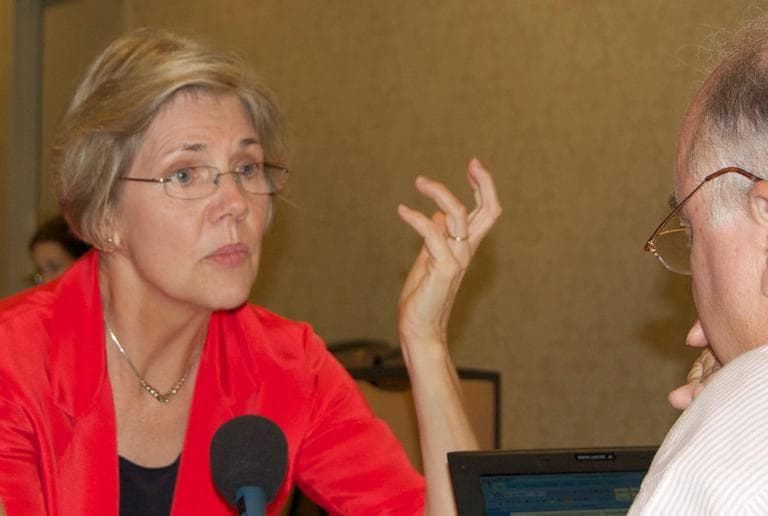Advertisement
Amid High Expectations, Warren To Address Convention
Resume
U.S. Senate candidate Elizabeth Warren addresses the Democratic National Convention Wednesday night, amid high expectations. Her campaign has already energized liberal Democrats around the country, so, as a sign of her stature as a national figure, Warren has been given a prime slot, just before former President Bill Clinton.
The Mass. Delegates On Warren
The Massachusetts delegates here in Charlotte are excited about Warren. She received a rousing reception when she addressed them at a breakfast Tuesday.
Delegate Nicole La Chapelle has been taking Warren to Latino neighborhoods in Springfield and to meet voters in towns all over western Massachusetts. She says Warren is a great grassroots campaigner.
"She is beyond walking the talk," La Chapelle said. "She's backing it up."
La Chapelle says she has never seen a candidate spend so much time talking to voters.
And yet, Warren trails Sen. Scott Brown in the latest Public Policy Polling survey, conducted last month. But that same survey found that most Massachusetts voters do not want Republicans to take control of the Senate.
Faye Morrison, a delegate from Ayer, wants Warren to remind voters of Brown's voting record.
"He has these great, sentimental, 'I'm just a regular guy' commercials where's he hugging this veteran and he loves veterans, but he doesn't love female veterans very much because he hasn't voted on anything in Washington that is good for us," Morrison said.
And Morrison's daughter is a veteran.
"With my daughter coming back from Iraq and now looking for a job, and this guy has voted against her being allowed to get the equal pay she gets when she's an active soldier, and he knows that," Morrison said. "She gets paid equally when she's activated, but why should she come back to this country and be paid less as a black female in this country in order to do the same work as a male? And he voted against those equal pay protections."
Like other moderate Republicans, such as Maine's Olympia Snowe and Susan Collins, Brown opposed legislation mandating equal pay for women, saying it would impose undue burdens on businesses.
Boston City Councilor Tito Jackson would like to see Warren campaign more in African-American neighborhoods in the city. He says Warren is very effective when addressing church groups because she draws on her background as a Sunday school teacher.
"She actually is able to make a strong connection," Jackson said. "She's able to use parables, but also she comes from a humble beginning, and she really connects with people."
Jackson says it's critical for African-Americans to turn out for President Obama and Warren in order to overwhelm Brown's advantage in white suburbs.
"If these communities turn out, then we win," Jackson said. "If they don't turn out, then there's some difficulty there."
Jackson recognizes that Obama has not developed the loyalty among Latino voters that he has with African-Americans, and this could pose a problem for Warren.
"The Latino community is going to be critical and key," said Jackson, who believes it's essential for Warren to be out campaigning in Latino neighborhoods.
"If we try to win this on TV and on radio, then we lose," Jackson said. "How we win this is door to door, people connecting with one another, organizing their friends, family, neighbors and their sphere of influence."
Members of the delegation rave about Warren's ability to connect with voters, but off mic, several do complain that Warren's campaign is not sending her to African-American and Latino neighborhoods enough, and is not allowing her to be herself.
Despite those criticisms, one political operative here praises her campaign for having learned to respond faster to put out potential fires, like the controversy over Warren's American Indian heritage that was allowed to simmer in the spring.
A Conversation With Warren
Warren will use her convention speech Wednesday night to try to help Obama by telling the listening and viewing audience that a Washington that works primarily for big business would be a huge setback for working-class America.
But Warren told WBUR's Bob Oakes the challenge in the presidential race revolves around the campaigns and the voters defining who has what she calls “the real vision for the future.”
“Is it as Mitt Romney and the Republicans say? Cut taxes for those at the top and let everybody else pick up the pieces,” Warren said. “Or is it, as President Obama says: Everybody has to pay a fair share and we have to make the investments to build a future."
Many voters may look at their own financial struggles and feel there needs to be a change in the Oval Office. Warren said many people are struggling, but the key question remains.
"I think what the Republicans are putting forward to build a future — cut taxes for the richest and let everyone else pick up the pieces — we tried that and that’s how we got into this mess," she said.
For the Senate race, many voters maintain that they're comfortable with Brown, who they say is a moderate, and some say Brown's more likable than Warren.
“He says a lot of nice things, and I don't think he's a bad guy," Warren said. "But the people of Massachusetts need a senator not who says some of right things some of the time. They need a senator they can count on all of the time.
“All I can do is be myself,” she added. “I can’t change anything. I am who I am. But I'm in this race because I believe that we can make changes together.